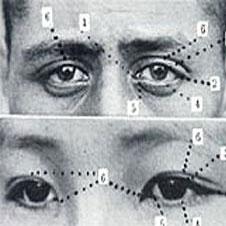
Editors Note: James Kenneth Duah-Agyeman, Ph.D., and Diane Swords, of Syracuse University submitted this article. With the amount of materials presented, this article will remain on the conversation for two weeks.
"By far the best documentary series on race of the last decade."
~Troy Duster, president, American Sociological Association
We tend to believe that the world’s people come divided into distinct groups – “red,” “black,” “white,” “yellow” – reflecting innate biological differences.
But what if we found out this isn’t true?
And if race isn’t biological, what is it?
Episode 1- The Difference Between Us examines the contemporary science - including genetics - that challenges our common sense assumptions that human beings can be bundled into three or four fundamentally different groups according to their physical traits.
Episode 2- The Story We Tell uncovers the roots of the race concept in North America, the 19th century science that legitimated it, and how it came to be held so fiercely in the western imagination. The episode is an eye-opening tale of how race served to rationalize, even justify, American social inequalities.
Episode 3- The House We Live In asks; If race is not biology, what is it? This episode uncovers how race resides not in nature but in politics, economics, and culture. It reveals how our social institutions "make" race by disproportionately channeling resources, power, status, and wealth to white people.
 RACE – The Power of an Illusion: A Long History Of Racial Preferences - For Whites
RACE – The Power of an Illusion: A Long History Of Racial Preferences - For Whites
Many middle-class white people, especially those of us who grew up in the suburbs, like to think we got to where we are today by virtue of our merit – hard work, intelligence, pluck, and maybe a little luck. And while we may be sympathetic to the plight of others, we close down when we hear the words “affirmative action” or “racial preferences.” We worked hard, we made it on our own, the thinking goes, why don’t ‘they’? After all, it’s been almost 40 years now since the passage of the Civil Rights Act.
What we don’t readily acknowledge is that racial preferences have a long, institutional history in this country - a white history. Here are a few ways in which government programs and practices have channeled wealth and opportunities to white people at the expense of others.
Early Racial Preferences
We all know the old history, but it’s still worth reminding ourselves of its scale and scope.
Affirmative action in the American “workplace” first began in the late 17th century when African slaves replaced European indentured servants - the original source of unfree labor, on the new tobacco plantations of Virginia and Maryland. In exchange for their support and their policing of the growing slave population, lower-class Europeans won new rights, entitlements, and opportunities from the planter elite.
White Americans also received a head start with the help of the U.S. Army. The 1830 Indian Removal Act, for example, forcibly relocated Cherokee, Creeks, and other eastern Indians to west of the Mississippi River to make room for white settlers. The 1862 Homestead Act followed suit, giving away millions of acres – for free - of what had been Indian Territory west of the Mississippi. Ultimately, 270 million acres, or 10 percent of the total land area of the United States, was converted to private hands, overwhelmingly white, under Homestead Act provisions.
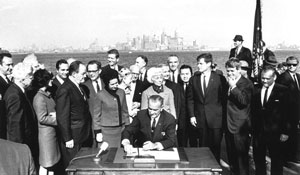 The 1790 Naturalization Act permitted only “free white persons” to become naturalized citizens, thus opening the doors to European immigrants but not others. Only citizens could vote, serve on juries, hold office, and in some cases, even hold property. In this the last century, Alien Land Laws passed in California and other states, reserved farm land for white growers by preventing Asian immigrants, ineligible to become citizens, from owning or leasing land. Immigration restrictions further limited opportunities for nonwhite groups. Racial barriers to naturalized U.S. citizenship weren’t removed until the McCarran-Walter Act in 1952, but white racial preferences in immigration remained in place until 1965.
The 1790 Naturalization Act permitted only “free white persons” to become naturalized citizens, thus opening the doors to European immigrants but not others. Only citizens could vote, serve on juries, hold office, and in some cases, even hold property. In this the last century, Alien Land Laws passed in California and other states, reserved farm land for white growers by preventing Asian immigrants, ineligible to become citizens, from owning or leasing land. Immigration restrictions further limited opportunities for nonwhite groups. Racial barriers to naturalized U.S. citizenship weren’t removed until the McCarran-Walter Act in 1952, but white racial preferences in immigration remained in place until 1965.
In the South, the federal government never followed through on General Sherman’s Civil War plan to divide up plantations and give each freed slave "40 acres and a mule" as reparations. Only once, did Washington D.C. provide monetary compensation for slavery. But that compensation was not paid to the emancipated slaves, government officials paid up to $300 per slave to local slaveholders as compensation for the loss of their property.
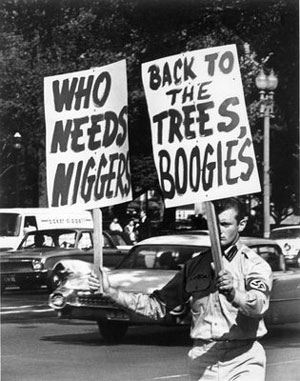 When slavery ended, its legacy lived on not only in the impoverished condition of Black people but in the wealth and prosperity that accrued to white slave-owners and their descendants. Economists who try to place a dollar value on how much white Americans have profited from 200 years of unpaid slave labor, including interest, begin their estimates at $1 trillion.
When slavery ended, its legacy lived on not only in the impoverished condition of Black people but in the wealth and prosperity that accrued to white slave-owners and their descendants. Economists who try to place a dollar value on how much white Americans have profited from 200 years of unpaid slave labor, including interest, begin their estimates at $1 trillion.
Jim Crow laws, instituted in the late 19th and early 20th century and not overturned in many states until the 1960s, reserved the best jobs, neighborhoods, schools, and hospitals for white people.
The Advantages Grow, Generation to Generation
Less known are more recent government racial preferences, first enacted during the New Deal, that directed wealth to white families and continues to shape life opportunities and chances today.
The landmark Social Security Act of 1935 provided a safety net for millions of workers, guaranteeing them an income after retirement. But the act specifically excluded two occupations: agricultural workers and domestic servants, who were predominately African-American, Mexican, and Asian.
As low-income workers, they also had the least opportunity to save for their retirement. They couldn’t pass wealth on to their children. Just the opposite. During old age, their children had to support them.
 Like Social Security, the 1935 Wagner Act helped establish an important new right for white people. By granting unions the power of collective bargaining, it helped millions of white workers gain entry into the middle class over the next 30 years. But the Wagner Act permitted unions to exclude non-whites and deny them access to better paid jobs, union protection, and benefits such as health care, job security, and pensions.
Like Social Security, the 1935 Wagner Act helped establish an important new right for white people. By granting unions the power of collective bargaining, it helped millions of white workers gain entry into the middle class over the next 30 years. But the Wagner Act permitted unions to exclude non-whites and deny them access to better paid jobs, union protection, and benefits such as health care, job security, and pensions.
Many craft unions remained nearly all-white well into the 1970s. In 1972, for example, every single one of the 3,000 members of Los Angeles Steam Fitters Local #250 was still white.
But it was another racialized New Deal program, the Federal Housing Administration, which helped generate much of the wealth that so many white families enjoy today. These revolutionary programs made it possible for millions of average white Americans - but not others - to own a home for the first time. The government set up a national neighborhood appraisal system, explicitly tying mortgage eligibility to race. Integrated communities were ipso facto deemed a financial risk, a policy known today as “redlining.” Between 1934 and 1962, the federal government backed $120 billion in home loans. More than 98 percent went to whites. Of the 350,000 new homes built with federal support in northern California between 1946 and 1960, fewer than 100 went to African-Americans.
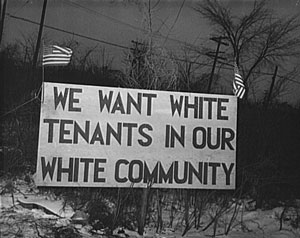 These government programs made possible the new segregated white suburbs that sprang up around the country after World War II. Government subsidies for municipal services helped develop and enhance these suburbs further, in turn fueling commercial investments. New freeways tied the suburbs to central business districts, but they often cut through and destroyed the vitality of non-white neighborhoods in the central city.
These government programs made possible the new segregated white suburbs that sprang up around the country after World War II. Government subsidies for municipal services helped develop and enhance these suburbs further, in turn fueling commercial investments. New freeways tied the suburbs to central business districts, but they often cut through and destroyed the vitality of non-white neighborhoods in the central city.
Today, Black and Latino mortgage applicants are still 60 percent more likely to be turned down for a loan than whites, even after controlling for employment, financial, and neighborhood factors. According to the Census, whites are more likely to be segregated than any other group. As recently as 1993, 86 percent of suburban whites still lived in neighborhoods with a black population of less than 1 percent.
Reaping the Rewards of Racial Preference
One result of the generations of preferential treatment for whites is that a typical white family today has on average of eight times the assets, or net worth, of a typical African-American family, according to New York University economist, Edward Wolff. Even when families of the same income are compared, white families have more than twice the wealth of Black families. Much of that wealth difference is attributed to the value of one’s home as well as how much one inherited from their parents.
But a family’s net worth is not simply the finish line, it’s also the starting point for the next generation. Those with wealth pass their assets on to their children - by financing a college education, lending a hand during hard times, or assisting with the down payment of a home. Some economists estimate that up to 80 percent of lifetime wealth accumulation depends on these intergenerational transfers. White advantage is passed down, from parent to child to grand-child. As a result, the racial wealth gap - and the head start enjoyed by whites - appears to have grown since the Civil Rights days.
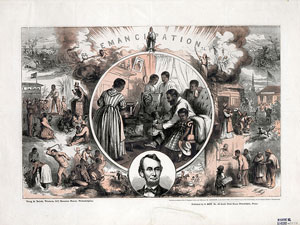 In 1865, just after Emancipation, it is not surprising that African-Americans owned only 0.5 percent of the total worth of the United States. But by 1990, a full 135 years after the abolition of slavery, Black Americans still possessed only a meager 1 percent of national wealth. As legal scholar, John A. Powell says in the documentary series Race – The Power of an Illusion, “The slick thing about whiteness is that whites are getting the spoils of a racist system even if they are not personally racist.”
In 1865, just after Emancipation, it is not surprising that African-Americans owned only 0.5 percent of the total worth of the United States. But by 1990, a full 135 years after the abolition of slavery, Black Americans still possessed only a meager 1 percent of national wealth. As legal scholar, John A. Powell says in the documentary series Race – The Power of an Illusion, “The slick thing about whiteness is that whites are getting the spoils of a racist system even if they are not personally racist.”
But rather than recognize how “racial preferences” have tilted the playing field and given us a head start in life, many whites continue to believe that race does not affect our lives. Instead, we chastise others for not achieving what we have; we even invert the situation and accuse non-whites of using “the race card” to advance themselves.
Or we suggest that differential outcomes may simply result from differences in "natural" ability or motivation. However, sociologist Dalton Conley’s research shows that when we compare the performance of families across racial lines that make not only the same income, but also hold similar net worth, a very interesting thing happens: many of the racial disparities in education, graduation rates, welfare usage, and other outcomes disappear. The "performance gap" between whites and nonwhites is a product not of nature, but unequal circumstances.
 “Colorblind” policies that treat everyone the same, no exceptions for minorities, are often counter-posed against affirmative action. But colorblindness today merely bolsters the unfair advantages that color-coded practices have enabled white Americans to accumulate.
“Colorblind” policies that treat everyone the same, no exceptions for minorities, are often counter-posed against affirmative action. But colorblindness today merely bolsters the unfair advantages that color-coded practices have enabled white Americans to accumulate.
Isn’t it a little late in the game to suddenly decide that race shouldn't matter?
About The Author: Larry Adelman is executive producer of RACE – The Power of an Illusion, a three part documentary series scrutinizing the very idea of race and available from California Newsreel at www.newsreel.org. Visit the companion website at www.pbs.org/Race.
TEN THINGS EVERYONE SHOULD KNOW ABOUT RACE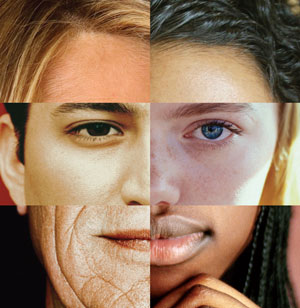 Our eyes tell us that people look different. No one has trouble distinguishing a Czech from a Chinese.
Our eyes tell us that people look different. No one has trouble distinguishing a Czech from a Chinese.
But what do those differences mean?
Are they biological?
Has race always been with us?
How does race affect people today?
There’s less – and more – to race than meets the eye:
- Race is a modern idea. Ancient societies, like the Greeks, did not divide people according to physical distinctions, but according to religion, status, class, even language. The English language didn’t even have the word ‘race’ until it turns up in 1508 in a poem by William Dunbar referring to a line of kings.
- Race has no genetic basis. Not one characteristic, trait, or even gene distinguishes all the members of one so-called race from all the members of another so-called race.
- Human subspecies don’t exist. Unlike many animals, modern humans simply haven’t been around long enough or isolated enough to evolve into separate subspecies or races. Despite surface appearances, we are one of the most similar of all species.
- Skin color really is only skin deep. Most traits are inherited independently from one another. The genes influencing skin color have nothing to do with the genes influencing hair form, eye shape, blood type, musical talent, athletic ability, or forms of intelligence. Knowing someone’s skin color doesn’t necessarily tell you anything else about him or her.
- Most variation is within, not between, “races.” Of the small amount of total human variation, 85 percent exists within any local population, be they Italians, Kurds, Koreans, or Cherokees. About 94 percent can be found within any continent. That means two random Koreans may be as genetically different as a Korean and an Italian.
- Slavery predates race. Throughout much of human history, societies have enslaved others, often as a result of conquest or war, even debt, but not because of physical characteristics or a belief in natural inferiority. Due to a unique set of historical circumstances, ours was the first slave system where all the slaves shared similar physical characteristics.
- Race and freedom evolved together. The U.S. was founded on the radical new principle that “All men are created equal.” But our early economy was based largely on slavery. How could this anomaly be rationalized? The new idea of race helped explain why some people could be denied the rights and freedoms that others took for granted.
- Race justified social inequalities as natural. As the race idea evolved, white superiority became “common sense” in America. It justified not only slavery but also the extermination of Indians, exclusion of Asian immigrants, and the taking of Mexican lands by a nation that professed a belief in democracy. Racial practices were institutionalized within American government, laws, and society.
- Race isn’t biological, but racism is still real. Race is a powerful social idea that gives people different access to opportunities and resources. Our government and social institutions have created advantages that disproportionately channel wealth, power, and resources to white people. This affects everyone, whether we are aware of it or not.
- Colorblindness will not end racism. Pretending race doesn’t exist is not the same as creating equality. Race is more than stereotypes and individual prejudice. To combat racism, we need to identify and remedy social policies and institutional practices that advantage some groups at the expense of others.
Copyright 2003 California Newsreel www.newsreel.org
Sources:
1935 Social Security Created
When Congress created social security in 1935, it provided a safety net for millions of workers, guaranteeing them an income after retirement. However, the act’s provisions excluded agricultural workers and domestic servants, who were predominantly African-American, Mexican, and Asian. As low-income workers, minorities had the least opportunity to save, were least likely to have pensions, and were most vulnerable to economic recession, yet they were systematically excluded from the protection and benefits granted to most Americans.
1935 Wagner Act
Like Social Security, the Wagner Act helped establish an important new right – to unionize. The act’s original version prohibited racial discrimination, but the American Federation of Labor fought against it and the final version permitted unions to exclude nonwhites. As a result, nonwhites were not only locked out of higher-paying jobs, they were also denied union protection and benefits: medical care, full employment, and job security. Moreover, they were legally barred from challenging their exclusion. Although the laws changed in the late 1950s, many craft unions remained all white well into the 1970s.
1930s-40s Spurred Growth
Beginning in the 1930s and 1940s, the federal government created programs that subsidized low-cost loans, opening up home ownership to millions of average Americans for the first time. At the same time, government underwriters introduced a national appraisal system, tying property value and loan eligibility to race. Consequently, all-white communities received the highest ratings and benefited from low-cost, government-backed loans, while minority and mixed neighborhoods received the lowest ratings and denied these loans. Of the $120 billion worth of new housing subsidized by the government between 1934 and 1962, less than 2 percent went to nonwhite families. Nonwhites were locked out of home ownership just as most white Americans were finally getting in.
1948 Supreme Court Rules
Restrictive covenants, which barred homeowners from selling or leasing their homes to nonwhites, were common in many neighborhoods across the U.S. Although they were outlawed by this Supreme Court decision, exclusion continued. Private developers could still refuse to sell homes to nonwhites, and real estate agents steered nonwhite prospective homebuyers away from white neighborhoods. Following government guidelines, lenders continued to base property appraisals on race, denying loans to communities with nonwhites or insisting on higher fees and interest rates to cover their “risk.” By systematically devaluing nonwhite neighborhoods and homebuyers, federal intervention helped disguise racial discrimination and enabled many to claim that the resulting segregation was “market driven.”
1949 National Housing Act
The housing market available to most nonwhites was rental and later, public housing in segregated urban centers. Government-sponsored urban redevelopment programs destroyed more housing than they built. Ninety percent of all housing destroyed by urban renewal was not replaced; two-thirds of those displaced were Black or Latino. As urban renewal projects destroyed taxable properties, the burden for maintaining social services was shifted onto fewer and fewer residents – encouraging white flight and making the poor poorer.
50s-60s Economic Housing Boom
During the 1950s and 1960s, more and more white homeowners moved to the suburbs. Federal and state tax dollars subsidized the construction and development of municipal services for suburbs, in turn fueling commercial investment. Freeways in major cities connected white suburbs to central business districts, but they were often built through core areas of black settlement. Many urban black areas lost their neighborhood shopping districts and successful small businesses as a result. By the 1960s, many businesses began moving jobs from cities to suburbs, further concentrating wealth and needed tax dollars away from urban areas.
1960s Fair Housing Laws Passed
In the 1960s, the government made several efforts to end housing discrimination, most notably Kennedy’s 1962 executive order, and the 1968 Fair Housing Act. Although these were important, they had little practical impact. Appraisers continued to factor race into their assessments and some practices, such as racial steering and predatory lending, continue to this day. It was not until 1988 that fair housing laws were amended to expand their scope and include important enforcement provisions. In the 1970s, ‘80s and ‘90s, housing prices rose dramatically, and white homeowners who benefited from discriminatory federal policies were able to sell their homes at great profit. Meanwhile, minority groups who had been denied federal assistance had homes worth far less or faced an even higher cost of entry into the housing market.
RACE – The Power of an Illusion was produced by California Newsreel, in association with the Independent Television Service (ITVS) with funds provided by the Corporation for Public Broadcasting. The Ford Foundation and the Corporation for Public Broadcasting Diversity Fund provided the major funding for this project. The Annie E. Casey Foundation, the John D. and Catherine T. MacArthur Foundation, Lida and Alejandro Zaffaroni, the Akonadi Foundation, the Wallace Alexander Gerbode Foundation, and Nu Lambda Trust provided the additional funding.

Comments
Implications of Race
Race is not a natural thing. Difference in color is based on the need of the area from where your ancestors are from is natural. Race should not be the deciding factor in a person's fate and treatment though since: 1) They can't control it. 2) There is no biological difference. 3) Every person has the same right as the next to have a good life without forced subordination to another person. It is interesting though why race has so much meaning in America still when the significance of color has faded in others. America seems like the past still has a huge hold on viewpoints when other countries have moved on.
I found the ten things we
I found the ten things we should know about race the most significant part of the entire article. It shoots down all of the beliefs that racist people have. I feel it shows them that their racism is clearly because they want to be racist and cruel but not because there is a clear difference in people and the different races. Racism has never made since to and this article justifies why it will never make since. It is sad to see that the European races that were enslaved before blacks accepted status to enslave another race. I would think since they went through the experience they would not let the next man have to go through this experience. they should have defended the African Americans. This was disapointing to me to see that we as a human race did not have compassion for the next man.
response to the ten things about race
I also found the ten things that we should know about race to be the most critical part of the whole article. Those ten points clarified any misconceptions that there might be about race and what can be learned from race. It proves that there is no way to group people into one specific category because people and their DNA are all so different. Grouping individuals goes beyond the color of their skin. Those ten facts alone show that the belief system of racist individuals is basically nonsense. I totally agree with what you said about this article proving that racism over all is nonsense and the justifications that individuals come up with for their hatred is also nonsense.
I found the ten things we
I found the ten things we should know about race the most significant part of the entire article. It shoots down all of the beliefs that racist people have. I feel it shows them that their racism is clearly because they want to be racist and cruel but not because there is a clear difference in people and the different races. Racism has never made since to and this article justifies why it will never make since. It is sad to see that the European races that were enslaved before blacks accepted status to enslave another race. I would think since they went through the experience they would not let the next man have to go through this experience. they should have defended the African Americans. This was disapointing to me to see that we as a human race did not have compassion for the next man.
Race?
Race is something that can't be distinguished due to the complexity of its merits. To me "Race" is just a word in the dictionary that is used by people to identify people from one another, but what many people don't know is that theres no such thing as race. If you ask me i'd have to say that its just a word people use to help modernize their society through differences and supremacy.This is supported with the fact that we are all equal whether you like it or not you better learn how to deal with it because for those of you who are having a hard time understanding this then you have a lot to learn, but for those of you who do understand then you should also know that we are all human thereefore we eat, communicate, utilize oxygen and many more necessities to survive. I can't understand how someone could create a word based on the differences of people's color, eye shape, size, etc.. that's like saying a orange is square when it's actually round, it just don't make any sense at all.
Why Race?
After becoming familiar with the "Race: The Power of an Illusion" documentary, I was blown away. Race is truly something that we as men have conjured out of thin air. Knowing that modern science has discredited any thought of any particular "race" being superior to another, is a great milestone. Armed with this knowledge, I feel much more affluent on what it means to be human. To be able to eliminate racism in our world, we all must be exposed to this truth. It will be a lengthy struggle, but I firmly believe in the possibility of a world with true equality.
Solving the Race Issue
The more I read about the different inequalities in regards to race the more I feel like there is no solution to it. This article says that there is no such thing as race, this would imply then there is no such thing as racism... yet people are still separated in to categories based on skin color and heritage. No matter how hard we try to explain away the term race it wouldn't matter because we would still be stuck with the same problem of inequality of groups of people. With Affirmative Action we have tried to stop this epidemic but it still prevails. We even have tried to ignore it completely saying that it doesn't matter, if a person tries hard enough they will make it regardless of skin color or hereditary back ground. However both of these attempts have failed. Not to sound to pesimistic but I do not think that there is an all around way to fix this, only small ways in which to improve it.
It's just history
Some of the reasons of why race is still such a big issue in the US is because of our history. The US historically subordinated new "races" to justify the actions they were taking to advance their own well being. A good example would be the Cherokee Indians which at first were considered a people who could be civilized and were allowed to assimilate into white culture. They could own land, businesses, and some even owned slaves. But when it came time for western expansion Cherokees stood in the way and at that point were deemed the enemy. They were forced to abandon everything and were relocated. Some may even go as far as to say that the US still practices using groups as ways for justification: Iraq, Afghanistan (oil and raw minerals)and instead of races its groups of people with like minded ideas(taliban)(al qaeda)
The victor always writes history
I think that it is definitely an unfortunate fact of that the victor (usually white, European) gets to write what becomes accepted as common knowledge and in our history books. We can go as far back as African history to look at conquests from other people/ nations, when the stereotype was created that people of darker skin color were weak, underdeveloped, and useless. I think that the African continent is definitely underdeveloped, but only because of intrusions and the exploitation of the African people by other groups. I believe that the U.S. in particular does use different means of justification for "involvement" in other countries. When things are going well, the U.S. claims to provide help and equal opportunities, when the reality is that our involvement may be detrimental to whatever government practices and cultural identity the people of the intruded nation hold. People want to look at our country's evolution as admiral and revolutionary, but if we want to look at the complete history then we have to look at the lesser-known accounts of the disgusting treatment towards "others" or those who were not deemed worthy of the country's wealth.
Will it ever end?
I have a hard time believing that racism is something that will ever end. There are so many people that are set in their ways and they are teaching their children to believe in these same things. I love the part of the article about the ten things that everyone should know about race. It basically summed up things that have constantly been debated about race, what it truly is, and what can be learned from studying it. I knew that African American people weren't treated equally but I wasn't aware of the extent to which they were treated poorly when it came to subjects like home ownership. Although we may have come far as far as racism goes, we still have a long way to go. Certain races are still being treated unfairly. Another thing that i found interesting was number six on the list of race facts. That was something new for me because when I think of racism my mind automatically goes to slavery. This article showed me that racism was a problem before slavery.
Illusion
I found this article to be very well-written and informative. Like those commenting before me, I appreciated the "10 Things Everyone Should Know About Race" and immediately hoped that more people would read, understand, and support that the points listed are crucial to our co-existance and development as different humans on this planet. The points about human subspecies, the modern conception of race, and the evolution of race/freedom/slavery stood out to me. While I agree with the author in thinking that we cannot IGNORE race completely, I think that the point about our modern preoccupation with race is important. We should embrace others based on their differences, but we should remember that every human life holds value. I was particularly pleased that the simultaneous evolution of freedom and slavery was mentioned. It is so ironic that people look(ed) to the U.S. as a place where everyone has the same opportunities and a country that began by thinking about freedom and individual rights, when we were also a country that denied the rights of people for socially constructed reasons and prejudices.
The beginning of the article also dealt with questions/ confusions I've had when thinking about the economic factors that support peoples' perceptions of whites being more successful than others. The issue of inheritance explains a lot about how the gap between races is so large: historically, it is evident that wealth was directed towards white families, even though it seems as though everyone has the same opportunities. We cannot ignore that the majority of white families are starting off with higher income, access to education, and connections than black families. When I think of the situation I immediately think of the gender debate and why women are not as successful as men. For me in the 21st century, the plight for women's rights runs parallel to civil rights because I am a black female and I want to be optimistic but I forsee future struggles for myself. In this article I see a different "glass ceiling" than the one that challenges women: I see a glass celiling for minorities who question why they are less successful economically than white/Europeans.
Social Security
I had no idea the negative impact of the Social Security Act of 1935. Until reading this article I had only ever thought of good things. Excluding agricultural workers and domestic servants is absurd to me. A lot of times the people in these positions work much harder than others. Actually, I am surprised to see all of the congressional acts listed at the end of this article excluding racial minorities from certain rights and privileges. I feel let down by my country when I read these. If this is supposed to be the "home of the free" then why wasn't it for the longest time?
Ten Things
I find it kind of sad that we as a people have become dependent on the institution of race. Although it is disproved biologically, I think that is something that is real in the world simply because people use it as a crutch to identify others. At this point in time, I think it would be very difficult for people to just drop racial terms from their daily lives. I believe that this is due to the need for people to differentiate themselves from one another and therein lies the human tendency to try and be "better" than others. I don't think it's impossible for us to transcend this notion of race, but it will take a long time and effort. When we, as a single species on this planet, can see past our differences and wholly accept the fact that we are fundamentally equal, we will finally be able to abandon the concept of race.
I think one of our country's
I think one of our country's main problems with race discremination and racism, is that we try to pretend that it didn't happen or that the past is the past and that it will never happen again, but in reality it still happens today, it is just that we as people discreminate unknowingly. Most people see a Hispanic and think to themselves if that person is an immigrant or not. It is not like we do it on purpose it is just the thought processes we have been exposed to. I agree that pretending race doesn't exist is not the same as equality. I say this because as stated above in the article America is built upon "White Supremacy". Just because a white male doesn't call you a color doesn't mean he feels you are on the same level he is on. He might feel that you are not even worth his time. Race is an illusion within itself. It is just an excuse to take advantage of people outside that society's norms and belittle them. Although slavery as taught through the history books is over, we are still enslaved to our society standards and if we don't change, it can be that way forever.
As a white person, prior to
As a white person, prior to reading the article, I was not as aware of how much of an advantage the founders of America favored whites. I didn't know about the 1790 naturalization act which only allowed whites to become citizens, or the fact that when social security was created in 1935, it favored whites as it excluded agricultural workers and domestic servants who were primarily Black, Mexican, and Asian. That gave the white man a huge advantage into the middle class, while it wasn't until 1965 that Johnson signed the new immigration act which abolished racial quotas. The effect of that has put whites above all in success as we were given an unfair advantage. However today, now that we are all settled in, I feel that advantages are more equal however we are now focusing on south of the border immigrants in terms of disadvantages. I guess some people feel like they pose a threat in terms of numbers and success so we have a lot of ways from preventing them citizenship. We never talk about the illegal Canadian immigrants, so i guess were not as concerned with illegal white immigrants because they blend in to the white majority.
It brings comfort see that
It brings comfort see that you as a ,white person, can recognize the inequality and advantage that white people have in this country. I say have because I disagree with your statement that we are now settled in and are more equal. The truth is that these advantages grew from the 1700's and continued up until friction with blacks fighting for there rights in the late 1900's. It is impossible for a group of people with decades of built up wealth, knowledge, and advantage to be equal to a group of people who just got voting rights in 1965. Disregarding the racism that still occurs institutionally in 2010. My point is that one should take the realization that has been made and carry it the present. This will help one see the privilege that they have and use it on for a greater purpose. The path of least resistance can be difficult, but this is what changes the world to truly make an equal society.
one step at a time
In today’s world most people move on with the past, but with some things in life you just cant. African Americans have been through so much and the past couple years starting from the time the little boy emit till, that gotten killed for whistling at a white girl, to Dr.king I have a dream speech. These are just some examples that show that African American history and all the struggles that each and every one of them slaves had to go through. Like Rosa Park ,one of the hero’s that stood up for her believes , she didn’t want to give her seat up in the front , to go to the back. A lot of these examples were just people that stood up for them. I’m not stating that these racism problems disappeared because it hasn’t, there still white and black issues, whites and blacks dating, blacks trying to get good jobs just so much other issues. Hopefully in the end of all this we will move on but not move on as and forget about the pass but as we remember the past and make changes and do better things and act as better people. Just one day at a time, it’s the little things that stand out the most.
We've all seen it but never thought about it...
History is an amazing thing. I've heard of and studied almost every law that was discussed in this article, but I never really thought about them. Schools don't tell you that things like Social Security were only for a selected group of people. When we discussed Native Americans begin driven away from their land, it was only in passing and the only reason my class discussed it a little more was because there was a Native American student in the class.
It's like, as a society, we have to divide ourselves. There is only one winner and several losers. I used to not understand the difference between Race and Ethnicity and now I do. As a society, we have devolped the word Race to try and put certain groups into neat little boxes, except ancestry is anything but neat. We determine race by looks, but that means nothing. When I wear my hair naturally people assume I'm black. When I keep it straight people assume I'm hispanic.
We are a highly superficial society and that's something we pass on to our youth. It's not only a concept that's passed on, but also actual materials.
Personally, I don't believe in absolute fairness. However, that does not mean that we should perpetuate all these attitudes towards different races and remain ignorant to the small and big things that keep people down. It's about talking to others about it and starting off with the basics of the difference between Race and Ethnicity.
It's all about the children
You make a good point in the beginning of your comment. How schools tend to pass over the more difficult areas while teaching history. I think that that is one of the most persistent reasons that "racism" and unfair advantages for minorities is a problem in the US today. Right now the generation that is in charge of most of the corporate world (white elites) were the ones who grew up or were born during a different era. An era where their parents/grandparents tried to engrain in them a sense of superiority over blacks and other ethnicities. Whereas today schools are still trying to become more and more integrated. Teachers and school boards are starting to get the idea to have the students think more critically instead of regurgitating facts about the civil war. They need have the students question the fact that there were people taken half way around the world just to be slaves. Have the students question the beliefs of the older generation. It is when a person is younger they are more impressionable. The more they are exposed to different cultures and ethnicities the more likely they are likely to grow up more comfortable and more accepting of people different from themselves. It is the younger generation that is the future and I think instead of trying to change the minds of the people already in power, we should focus on the education of the younger generation.
Modern Racism
I feel that society has come a long way since the New Deal and other obviously racially segregated acts were set. It really surprised me that those clearly unfair laws actually passed and it makes me wonder about the true mindset that the people of the time period had. While I know that there are still those who are racist in the world today, I feel that overall, most people would agree that all people are created equal and that something like that would never, ever pass in government today. However, I think that it is natural for people to want to classify others into groups and that racial features are one of the first things that people notice. I don't think that we will ever come to a point where racial distinction does not exist, but that shouldn't be the goal. Whether we want to admit it or not, race does indeed say something about us. It does not define our intelligence, talents, or personality, but it does reflect our culture and experiences. Everyone has at some point in their lives been treated differently or judged because of their race. Race is something that is entirely uncontrollable but does affect who we are today.
Response to Modern Racism
I understand that race can affect our experiences, but it doesn't have to be that way. In my opinion, this perpetuates the idea that race is the right way to classify people (instead of recognizing that it is a social construct). Instead of focusing on how our culture fits in with our "race," we should be grouped based on culture and common interests. For example, my boyfriend is white, but he was born and raised in Nigeria as a missionary kid. He fits in with many of the cultures from that society, and his mannerisms are even affected by his background (even though he hasn't lived there for over ten years). His race is obviously different from the majority of the population of Nigeria, but they still share many similar interests and identifies with the culture of that region. Because race is a social construct, it CAN be controlled, assuming that society is willing to do so. That's the problem. People have to first educate themselves on the issue of race, and then commit to doing something about it. It's obviously a big undertaking, but it can certainly happen over time, if people would commit to it.
Race is modern
I was rather surprised to discover that Race was a relatively modern idea. However, thinking about it makes me realize that in older texts, such as the bible, race was never mentioned; religion, birthplace, and wealth were mentioned, but not race. Only when Africans were taken from their homes and enslaved was the idea of race born. It's not hard to imagine that the white men who enslaved the blacks would need to justify slavery, and with nothing to do so, they would create a new sort of classification that would make the Africans seem more "Primitive" than them. thus, race and everythig that goes with it was born.
Does Race Exist?
Race is something that is made up. It has nothing to do with biology, and it has no effect on the intelligence of a person. Race is something that society has created and legitimized. Whether we want to or not, we use race on a daily bases to group people together. White, black, brown, it doesn’t matter; we are all part of the group that society decides. We don’t even have a say in what group we are put in. Do to this grouping of people we experience things such as stereo types, discrimination, inequality, and much more. We don’t even know why we give race so much power, but we do. I believe we all need to realize that we have been programmed to think a specific way, and no matter how hard we try we cannot help it. We can go around and around the issue for ever, but then nothing is solved. We need to deal with the issue head on and not be scared of it. We, as society, created race, so we can do away with it.
Race does exist
I agree with this article to a certain point however, we need to realize that race is not something we created recently. It existed for a long time but this isn't limited to just our colors. Race isn't just about black white or brown it is more of about the different cultures of these societies. Even though stereo type is wrong and usually leads to discrimination but it is based on the cultures this societies came from. The solution to racism is to act upon it by first of all recognizing its existence. If we all accept all the races then equality could be established. The existence of different races is an advantage to all of us as it creates diversity.
Racism and Wealth
I agree that racism is a modern concept. It has been prevalent in the United States since the colonies were forming. It is a way to keep the people in power, which is often the wealthy White elite. This system has been put in place so that there is a distinction in the community. In this article, the typical White family has more wealth than the average Black family. Not only does that mean their family is well off, but their family and generations after them have a leg up on the rest of the world. Wealthier families can send their children off to college and pass on assets. This helps their children further the economic gap. People born of lower class families are born with a disadvantage. These individuals can't control their skin color and they can't control the family they were born in to. So the only way they can get out, is with the help of affirmative action programs. I believe these programs are helping diversify the community. It is not taking jobs away from Whites because companies need to meet quota, but it is giving people of color and opportunity, to get an advantage to help their future generations.
Implications of Race
I was really surprised by all the acts passed by Congress allowing for advantages for whites. It is disappointing to see that the basic principals this country was founded on was not held true. Although it is stated all men are created equally, they are not being treated that way. Although all the acts that allowed for advantages for white people are very disappointing and half of them I did not even realize existed, I think this article takes away from all the accomplishments of white people. Even though they may have been more advantaged under the law, there are white people that have had to overcome adversities.
It was really surprising to
It was really surprising to me that after 135 years, blacks still only own one percent of the national wealth. I was well aware that racism still exists, but I thought it was more on a personal level. I did not know about all the recent laws passed that restrict other races.
In the video, a class looked at their DNA and compared it to the DNA of others in the class and people around the world. They found that they could be more genetically similar to someone from a different race than someone who looks just like them. It is crazy to think about how big of a deal we make race, when in reality, it doesn't make any difference at all.
I hate how people protest affirmative action. They say it is reverse racism and that it takes jobs away from more qualified white men. They did not care about laws that kept them in control, but now that there is one that helps others out, they notice.
Something to be Celebrated, Not Taken Advantage Of
Before reading this article I had no idea that race was a modern term. It was news to me that people used to be categorized by their religion and social status rather than their ‘race’. What also came as a surprise was that there was virtually no biological difference between races. This just goes to show that there is indeed no ‘superior race.’ However, it saddens me to know that our society is still functioning in that mindset in many ways. I think that many times we think of racism as being a thing of the past, but this article clearly shows many examples of how it is still with us. It is sad that in a nation built on the idea that all men are created equal creates such disadvantages for certain people because of their skin color. Different skin colors represent different cultures, families, and regions of the world, and is something to be celebrated, not taken advantage of. No ‘race’ is superior to any other, and our society and government should reflect that in their intentions and actions.
Agree
With no doubt in my mind, I agree with you. I think that you are completely right about that race is something to be celebrated. I also think that if there was a superior race then there would be an elimination of another race if that was so. I blows my mind that physical features are judged about a person. I believe that race is the main cause of problems in society and once this idea of race is no longer there, then society will reach its full potential.
I agree, I myself was one of
I agree, I myself was one of those people who didn't know that race was a modern term. I had an idea that people were separated by class and religion way back in the days ,but i have been so used to taking standardized tests where the first page tells you to fill in the bubble of your race. I was also surprised to find out that their was no biological difference between people of different skin tones, not even a slight difference. So yes you are fight, there is no such thing as a superior race as some ignorant people like to claim and it is sad to see. I like your title "Race is something to be celebrated, Not taken advantage of" because our differences are what makes life interesting.
Pages